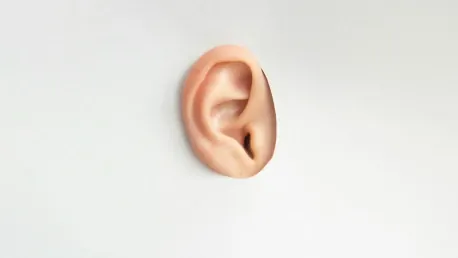Hearing loss is an “invisible disability” that affects millions of people globally, often leading to social isolation and mental health issues. Unlike physical disabilities that have clear visual indicators, hearing loss is not immediately evident, prompting many to withdraw from conversations and social interactions. This withdrawal often exacerbates feelings of loneliness, anxiety, and depression. Brent Lucas, CEO of Envoy Medical, emphasizes that the social isolation experienced by individuals with hearing loss is a significant issue that needs more attention. People affected by hearing loss may not only suffer from impaired communication but are also at a heightened risk of mental health problems due to their disengagement from society.
Brent Lucas also highlights the significant cognitive implications of untreated hearing loss, pointing out that this silent condition can have dire consequences on brain health. Studies by Johns Hopkins University have shown a direct correlation between hearing loss and cognitive decline. The hypothesis suggests that the brain, much like a muscle, needs regular stimulation to maintain its function. When sound input is absent or severely diminished, the brain’s auditory pathways might begin to atrophy. Individuals with untreated hearing loss often face a higher risk of developing conditions like dementia. This connection underscores the importance of addressing hearing loss not just for communication but for preserving cognitive health. Fully implanted hearing devices are gaining attention for their potential to significantly mitigate these cognitive risks by providing a consistent and natural hearing experience.
Apple’s Contributions and Market Entry
The integration of clinical-grade hearing aid features in Apple’s AirPods Pro 2 marks a significant step in raising awareness about hearing health. Brent Lucas views Apple’s involvement positively, seeing it as a validation of hearing loss as a mainstream issue worthy of attention. The increased visibility and awareness could lead to earlier interventions and better outcomes for those affected by hearing loss. Apple’s entry into the hearing health market underscores a broader trend of tech giants recognizing the importance of hearing health and contributing to innovative solutions.
Apple’s efforts serve to highlight the growing need for effective and user-friendly hearing solutions. As more major companies enter the conversation, the stigma surrounding hearing loss could lessen, encouraging more people to seek help. Lucas hopes that this heightened awareness will prompt individuals to address hearing concerns earlier, potentially reducing the long-term impacts on their cognitive and mental health. The tech industry’s involvement is particularly crucial as it brings cutting-edge technology to the forefront, making it more accessible to the general public. This shift can drive advancements in hearing aid technology, leading to more sophisticated and effective devices.
Fully Implanted Devices: A Game Changer
Envoy Medical’s fully implanted hearing devices stand at the forefront of hearing technology, set to revolutionize the way people experience sound. These devices, which have no external components, promise to transform daily life for users. Unlike traditional hearing aids, fully implanted devices offer 24/7 functionality, allowing users to wear them while sleeping, swimming, or in windy environments without any inconvenience. The seamless integration into daily life means users do not have to worry about removing and adjusting the device, which is a common issue with traditional hearing aids. Brent Lucas emphasizes the practical benefits of fully implanted devices, citing their ability to provide continuous auditory input without the physical or aesthetic hindrances of conventional aids.
Traditional hearing aids often require manual adjustments and face compatibility issues with other devices, adding to the user’s burden. Fully implanted devices eliminate these problems, significantly enhancing the quality of life for many users. Lucas shares a touching story of a patient who could engage in bedtime conversations again, illustrating the profound personal impact of this technology. By providing a more natural hearing experience, these devices also help to maintain cognitive functions by ensuring continuous stimulation to the brain’s auditory pathways. This aspect is crucial for individuals at risk of cognitive decline due to untreated hearing loss. Fully implanted hearing devices represent a significant leap forward in hearing health, offering a more comprehensive solution that addresses both auditory and cognitive needs.
Challenges to Adoption
Despite their numerous advantages, fully implanted hearing devices face significant challenges, primarily cost and insurance coverage. Brent Lucas acknowledges that the Esteem device by Envoy Medical is currently not covered by Medicare and Medicaid in the U.S., owing to its classification as a hearing aid. This misclassification places a financial burden on patients, who are often forced to pay out of pocket for these advanced devices. Efforts are ongoing to address this issue through legislative means, but progress has been slow. This regulatory challenge highlights the broader issue of accessibility and affordability in hearing health care. Lucas advocates for policy changes that would provide proper insurance coverage for fully implanted devices, making them accessible to a broader population.
Another significant hurdle is the lack of awareness among both patients and audiologists. Many audiologists tend to recommend only the hearing aids they sell, limiting patients’ exposure to alternative options like fully implanted devices. Lucas stresses the importance of patients taking a proactive approach in researching and considering all available solutions. The lack of widespread knowledge about fully implanted devices means that many individuals are missing out on potentially life-changing technology. Educating both audiologists and patients about the benefits and options available is crucial for the broader adoption of these innovative devices. By increasing awareness and advocating for better insurance coverage, the hearing health community can take significant steps toward making these advanced solutions more accessible.
Future Innovations in Hearing Technology
The field of hearing health is rapidly evolving, with significant advancements in AI and machine learning poised to play transformative roles. These technologies allow for automatic adjustments to hearing aids, offering efficient background noise filtration and optimized performance in varying environments. Although Envoy Medical hasn’t yet integrated AI into their fully implanted devices, Brent Lucas believes that future innovations could include AI-driven real-time sound enhancement and adaptive tuning based on user habits. The potential for AI to learn and adapt to individual preferences and environments could significantly improve the user experience, making hearing devices more intuitive and effective.
Researchers are also exploring gene therapy and pharmaceutical treatments for hearing loss, though Lucas remains skeptical about their near-term viability. While these areas of research are promising and may offer solutions in the future, practical and widely accessible treatments for hearing loss are still at a distant horizon. The focus for now remains on enhancing current technologies and making them more accessible to those in need. Lucas underscores the importance of continuous research and development in this field to uncover new possibilities. The integration of cutting-edge technology and innovative treatment approaches holds the promise of breaking new ground in hearing health, making it an exciting area of medical research and development.
A Call to Reframe Hearing Health
Brent Lucas advocates for a fundamental shift in how society perceives hearing health, emphasizing that it should be treated with the same importance as vision or dental health. Regular hearing checkups should become as routine as visits to the optometrist or dentist, ensuring early detection and treatment of hearing loss. Addressing hearing loss at an early stage can prevent the associated mental and cognitive declines, leading to better overall health outcomes. By reframing hearing health as a vital component of overall well-being, society can work towards reducing the stigma and encouraging proactive management of hearing issues.
For individuals who suspect they may have hearing issues, Lucas recommends using the built-in hearing test on Apple’s iPhone as an initial step. While not a perfect solution, it provides an accessible starting point for those concerned about their hearing health. Taking early action can make a significant difference in managing hearing loss effectively. The message is clear: hearing health should be prioritized alongside other aspects of personal health, and individuals should be encouraged to seek evaluations and treatment without hesitation. By fostering a more proactive and informed approach to hearing health, we can ensure better outcomes and improved quality of life for those affected by hearing loss.
Insightful Future Directions
Hearing loss is an “invisible disability” impacting millions worldwide, often leading to social isolation and mental health problems. Unlike physical disabilities that are visible, hearing loss isn’t immediately recognizable, causing many to retreat from conversations and social settings. This isolation can worsen feelings of loneliness, anxiety, and depression. Brent Lucas, CEO of Envoy Medical, stresses the need for greater attention to the issue of social isolation faced by those with hearing loss. People with hearing loss not only struggle with communication but also face increased mental health risks due to their reduced social engagement.
Lucas further highlights the cognitive impacts of untreated hearing loss, noting its serious consequences for brain health. Research from Johns Hopkins University indicates a direct link between hearing loss and cognitive decline. The theory is that the brain, similar to a muscle, requires regular stimulation to function well. Without adequate sound input, the brain’s auditory pathways may weaken. Those with untreated hearing loss are at a higher risk for dementia. This illustrates the importance of addressing hearing loss to maintain cognitive health. Fully implanted hearing devices are gaining attention for their potential to reduce these cognitive risks by offering a consistent and natural hearing experience.









